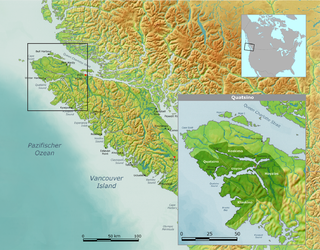
Convolvulaceae, known commonly as the bindweed or morning glory family, is a family of about 60 genera and more than 1,650 species of mostly herbaceous vines, but also trees, shrubs and herbs, and also including the sweet potato and a few other food tubers.
This article is about the spiritual beliefs, histories and practices in Kwakwaka'wakw mythology. The Kwakwaka'wakw are a group of Indigenous nations, numbering about 5,500, who live in the central coast of British Columbia on northern Vancouver Island and the mainland. Kwakwaka'wakw translates into "Kwak'wala-speaking tribes." However, the tribes are single autonomous nations and do not view themselves collectively as one group.

The Kwakwa̱ka̱ʼwakw, also known as the Kwakiutl are Indigenous peoples of the Pacific Northwest Coast. Their current population, according to a 2016 census, is 3,665. Most live in their traditional territory on northern Vancouver Island, nearby smaller islands including the Discovery Islands, and the adjacent British Columbia mainland. Some also live outside their homelands in urban areas such as Victoria and Vancouver. They are politically organized into 13 band governments.

Wakashan is a family of languages spoken in British Columbia around and on Vancouver Island, and in the northwestern corner of the Olympic Peninsula of Washington state, on the south side of the Strait of Juan de Fuca.

The Quatsino First Nation is the First Nations band government of the Gwat'sinux subgroup of the Kwakwaka'wakw peoples, based in the Quatsino Sound region on the west coast of northern Vancouver Island in British Columbia, Canada, focused on the community of Coal Harbour in Quatsino Sound. It is a member of the Kwakiutl District Council and, for treaty negotiation purposes, the Winalagalis Treaty Group which includes three other members of the Kwakiutl District Council (the Da'naxda'xw Awaetlatla Nation, Gwa'Sala-Nakwaxda'xw Nation, and the Tlatlasikwala Nation.
The Da'naxda'xw Nation, or Da'naxda'xw/Awaetlatla Nation is a First Nation government in northern Vancouver Island in British Columbia, Canada, their main community is the community of Alert Bay, British Columbia in the Queen Charlotte Strait region. There are approximately 225 members of the Da'naxda'xw Nation. The Nation is a member of the Kwakiutl District Council and, for treaty negotiation purposes, the Winalagalis Treaty Group which includes three other members of the Kwakiutl District Council (the Quatsino First Nation, the Gwa'Sala-Nakwaxda'xw Nation, and the Tlatlasikwala Nation.
The Tlatlasikwala Nation is a First Nations band government based on northern Vancouver Island in British Columbia, Canada, focused on the community of Port Hardy, British Columbia in the Queen Charlotte Strait region. It is a member of the Kwakiutl District Council and, for treaty negotiation purposes, the Winalagalis Treaty Group which includes three other members of the Kwakiutl District Council (the Quatsino First Nation, the Da'naxda'xw Awaetlatla Nation, and the Gwa'Sala-'Nakwaxda'xw Nation.
The Kwakiutl District Council, also spelled Kwakwewlth District Council and Kwakiuth District Council, pronounced Kwagiulth District Council, is a First Nations Tribal Council based on Vancouver Island in British Columbia, Canada, based in the community of Campbell River, British Columbia in the northern Strait of Georgia but including member nations spanning northern Vancouver Island as far as Quatsino Sound. The nations represented within the Kwakiutl District Council are all Kwakwaka'wakw.
The K'ómoks First Nation, also known as the Comox Indian Band, is the band government of the Island Comox or K'ómoks people of Vancouver Island, British Columbia, Canada. Closely allied to the Cape Mudge and Campbell River First Nations, historically they were a Coast Salish people since integrated into Kwakwaka'wakw society. Originally part of the Laich-kwil-tach Council of Chiefs, which is a treaty society, they are now negotiating independently in the BC Treaty Process. They remain a member government of the Kwakiutl District Council.

Winalagalis is a war god of the Kwakwaka'wakw native people of British Columbia. He travels the world, making war. Winalagilis comes from North (underworld) to winter with the Kwakwaka'wakw. Winalagalis is the bringer and ruler of Tseka, and imbues red cedar bark with supernatural power.
Julia Pavlovna Petrova-Averkieva was a Soviet anthropologist and string figure collector. A student of Franz Boas, and influenced by Lewis Henry Morgan, she went on to serve as the director of North American Studies at the Institute of Ethnography in Moscow. She compiled the Kwakwaka'wakw, which is recognized as "the most comprehensive Native American string figure collection ever assembled from a single tribe [or nation]."

Philotarsus is a genus of loving barklice in the family Philotarsidae. There are about 18 described species in Philotarsus.
Milesia scutellata is a species of syrphid fly in the family Syrphidae.
Mixogaster breviventris is a species of syrphid fly in the family Syrphidae.
Chrysotoxum chinook is a species of syrphid fly in the family Syrphidae.
Aradus funestus is a species of flat bug in the family Aradidae. It is found in North America.
Aradus depictus is a species of flat bug in the family Aradidae. It is found in North America.
Sphecomyia nasica is a species of syrphid fly in the family Syrphidae.
Spilomyia liturata is a species of syrphid fly in the family Syrphidae.
Animal Ethics is a nonprofit organization formed to promote discussion and debate around issues in animal ethics and to provide information and resources for animal advocates. They also do outreach work in several countries on the issue of speciesism. Their aim is to create a world where moral consideration is extended to all sentient beings. The organization's website covers topics such as speciesism, sentience, veganism and wild animal suffering and has content translated into several languages.





